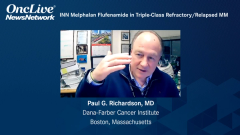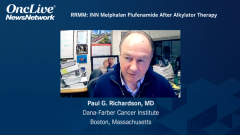
HORIZON vs MAMMOTH Explored in R/R Multiple Myeloma
Episodes in this series

Paul G. Richardson, MD: The HORIZON study is a particularly important trial because it’s the largest single-arm experience of Melflufen of its kind, in which we enrolled 157 patients with relapsed and refractory multiple myeloma in whom other treatments have failed. Most important, they had to be resistant to pomalidomide or daratumumab, or another CD38-targeting antibody, or both. As a result, the majority of patients were what we call triple-class resistant, and we were enriched for very adverse features, such as extramedullary disease.
At context, Melflufen was given once every month with dexamethasone given weekly. It should be noted that we’ve demonstrated in the laboratory that Melflufen is synergistic with steroids, and so all these patients were already steroid-refractory. Nonetheless, when you combine it with Melflufen, you’re able to demonstrate excellent response rates. We’ve been able to show this in the previous study called the O-12-M1 trial published in The Lancet Hematology last year. With that, the HORIZON study has completed, and we have mature follow-up in being able to show very a solid response rate of around 30% in patients in whom all other approved drugs have failed. In that context, because they were triple-class resistant, for example, and enriched for extramedullary disease, we were very encouraged to see a clinical benefit was apparent.
To understand whether the signal from the HORIZON trial—in terms of clinical benefit compared with other studies in this setting—was really tangible, there was a very nice comparison done by my colleagues looking at HORIZON vs MAMMOTH. It was an indirect comparison of efficacy outcomes for patients with relapsed/refractory myeloma to anti-CD38 monoclonal antibodies vs patients who were antibody-refractory treated with Melflufen plus dexamethasone vs conventional or approved agents.
In this particular study, they were able to show very nicely that for patients who were refractory to anti-CD38 monoclonal antibody therapy, there was longer survival outcome with Melflufen and dexamethasone than was typically seen with other drugs in the MAMMOTH study. To be precise, the median progression-free survival for Melflufen plus dexamethasone was 4.6 months, and the overall survival was 15.4 months. Unfortunately, the MAMMOTH trial, which was looking at salvage therapies after daratumumab-based treatment had failed, showed substantially shorter progression-free survival intervals and overall survival, making this an attractive comparison. This analysis really underscored the high burden of disease and unmet medical need for patients with relapsed/refractory myeloma and the importance of novel combination therapy in this setting.
Transcript Edited for Clarity












































